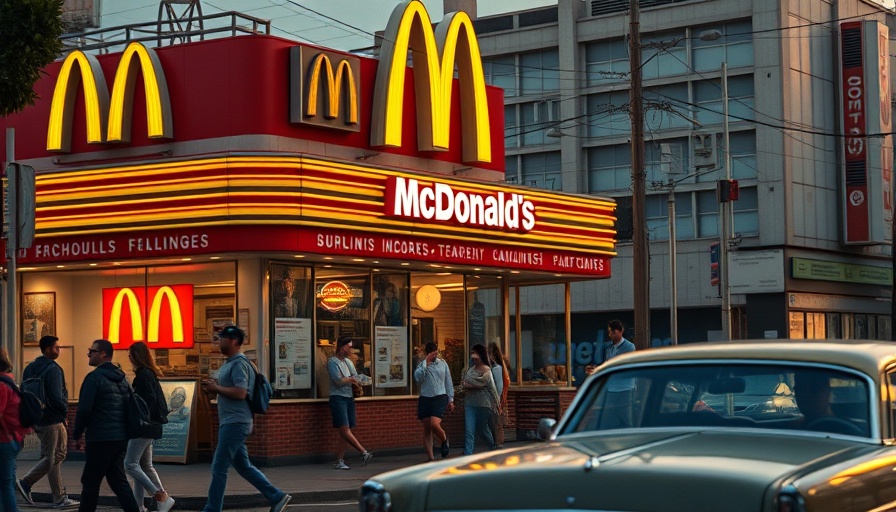
Unlocking Nostalgia: McDonald’s Strikes a Chord with McDonaldland Meal
In a world where nostalgia often tugs at the heartstrings, McDonald’s re-emerges as a master of marketing that capitalizes not just on taste, but on sentimental memories. Recently, the fast-food giant announced the launch of the McDonaldland Meal, a nostalgic offering that aims to reconnect adults with the joy of their childhood meals. What makes this campaign particularly noteworthy is how it strategically taps into the memories of the Millennial and Gen X demographics, enticing them to indulge while reminiscing about simpler times.
The Power of Memory in Marketing
The McDonaldland Meal, according to the company, aims to “unlock core memories” for its customers. This is a bold claim that speaks volumes about how brands can leverage consumer psychology. By introducing limited-edition items like the Mt. McDonaldland Shake alongside childhood staples such as the Quarter Pounder and iconic World Famous Fries, McDonald’s is not merely selling food; they are selling an experience steeped in nostalgia. Marketing experts note that such campaigns effectively activate the emotional triggers associated with youth and carefree days, which in turn drives consumer engagement.
Reviving Familiar Characters for Modern Appeal
Central to this nostalgic revival is the ensemble of characters from the McDonaldland world, including Ronald McDonald, Grimace, and the Hamburglar. These characters, once a staple of childhood entertainment, are being reintroduced to foster a sense of whimsy and delight. This strategic decision invites parents, who grew up with these icons, to connect with their children in a shared experience over a meal. It’s both a marketing genius move and a heartfelt gesture towards creating family memories.
Why Nostalgia Matters in Today’s Market
As Millennials begin to dominate the parent demographic, brands like McDonald’s are recognizing the intrinsic value of nostalgia. This generation, now in their late twenties to early forties, holds significant purchasing power, especially when it comes to their children. By reviving classic characters and themes, McDonald’s not only appeals to parents’ emotional connections but also secures their children’s interest, effectively cultivating brand loyalty for generations. Nostalgia isn't just about looking back; it's a tool for forging future relationships.
Potential Risks and Counterarguments
However, nostalgia marketing is not without its critics. Some argue that relying on past sentiments may indicate a lack of innovation within the brand. Furthermore, there’s a risk that younger consumers, less familiar with McDonaldland, may view the marketing efforts as attempts to manipulate emotions rather than as genuine engagement. It raises the question: Can a brand truly evoke nostalgia among consumers who have no personal connection to its past?
Trends in Fast Food Marketing
Interestingly, McDonald’s isn’t the only brand leaning into nostalgia. Many businesses are realizing the efficacy of creating emotional connections with their consumers. From retro products to throwback advertising strategies, nostalgia marketing is a current trend that bridges generational gaps. It's a critical strategy not only for attracting older customer bases but also for establishing relevance in an ever-competitive market.
Looking Ahead: What This Means for Small Businesses
For consultants, coaches, and small business owners, there are invaluable lessons to be gleaned from McDonald’s recent endeavor. Understanding your target audience's emotions and memories can translate into effective marketing strategies. Additionally, creating shared experiences and building community through familiar symbols can foster loyalty and enrich customer interactions. As small businesses ponder ways to resonate with their audiences, the lesson is clear: tapping into nostalgia may open a pathway to deeper customer connections and new growth.
Final Thoughts
As McDonald’s rolls out its McDonaldland Meal, it serves as a reminder of the importance of connecting with consumers on a deeper level. Nostalgia, as evidenced by this campaign, is not merely a marketing strategy; it’s an engagement tool that has the power to evoke joy and foster connections across generations. This could potentially influence the future direction of fast-food marketing as well as other sectors, leading the way for exciting innovations borne from the essence of shared memories.
 Add Row
Add Row  Add
Add 




Write A Comment